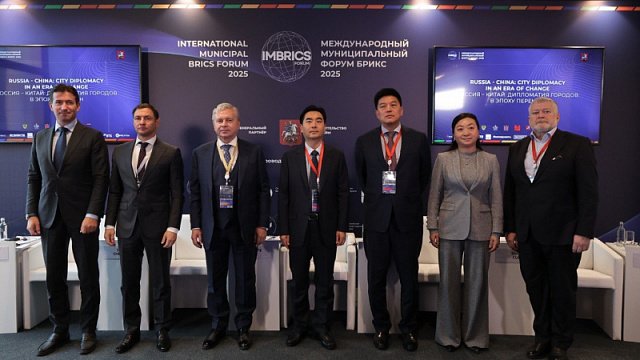
The International Municipal BRICS Forum in St. Petersburg concluded with the signing of more than 70 cooperation agreements. Representatives of municipalities from 75 countries took part in the event. The TV BRICS International Media Network served as the forum’s international media partner.
The discussions focused on issues of financial and economic cooperation, the development of digital technologies, and youth policy. Participants agreed to strengthen multilateral cooperation among BRICS countries and their partners through urban diplomacy, joint projects in the field of creative industries, and cultural exchange.
During the panel session “Russia – China: urban diplomacy in an era of change” it was announced that the volume of bilateral economic cooperation between the Russian Federation and the People’s Republic of China amounted to US$104 billion.
“Within BRICS, we plan to build strong relationships that will bear fruit in the future – particularly in the areas of innovation, economy, and high technology. We are seeing positive dynamics in science, education, and the economy. We want to create the same solid platform for the development of our relations,” said Du Jianqiang, Party Group Secretary and Head of the Zhengzhou Municipal People’s Government (PRC).

Sergey Cheremin, Minister of the Moscow City Government, announced the strengthening of cooperation with the Cuban capital. According to him, a new cooperation programme between the capitals of the two states was signed at the forum.
“It is very important for us that Moscow can take part in the week dedicated to relations with Russia in May. We will prepare this event with all our warmth. We are a partner country, and with your support, we strive to become a full-fledged participant in BRICS,” said Governor of Havana Yanet Hernandez Perez.
A separate session was devoted to the development of creative industries. Deputy Chair of the Federation Council Inna Svyatenko stated that this sector accounts for more than 3 per cent of global GDP.
“For us, the export of creative industries abroad – animation, fashion, crafts, digital services – is extremely important,” the senator noted.

Aaron Mokgale Maluleka, Member of the Executive Committee of the Mayor of Tshwane (South Africa), emphasised the importance of the BRICS format for strengthening international ties.
“We are establishing trade relations with Tanzania, Uganda, and others. BRICS creates a network of opportunities – a springboard for upward movement. We are developing cultural exchange, focusing on digitalisation and environmental issues,” he said.
A separate session was dedicated to volunteer programmes. David Okpatuma, co-founder of the “Development and Cooperation for Africa” initiative, noted that in Rwanda, for example, a public health volunteer programme is operating effectively. Volunteers there are seen not merely as temporary assistants but as part of the national healthcare system.
The Moscow City Government served as the General Partner of the International Municipal BRICS Forum 2025. The forum was held with the support of the Federation Council, the Ministry of Foreign Affairs of the Russian Federation, the Government of St. Petersburg, the Moscow City Duma, the All-Russian Association for the Development of Local Self-Government, the Moscow Chamber of Commerce and Industry, the Russian Union of Industrialists and Entrepreneurs, and the Roscongress Foundation.
Photo: International Municipal BRICS Forum Directorate
Самые
актуальные новости стран БРИКС https://tvbrics.com

